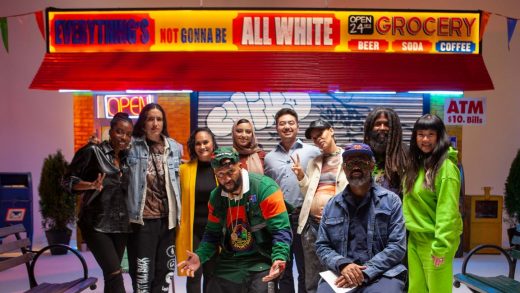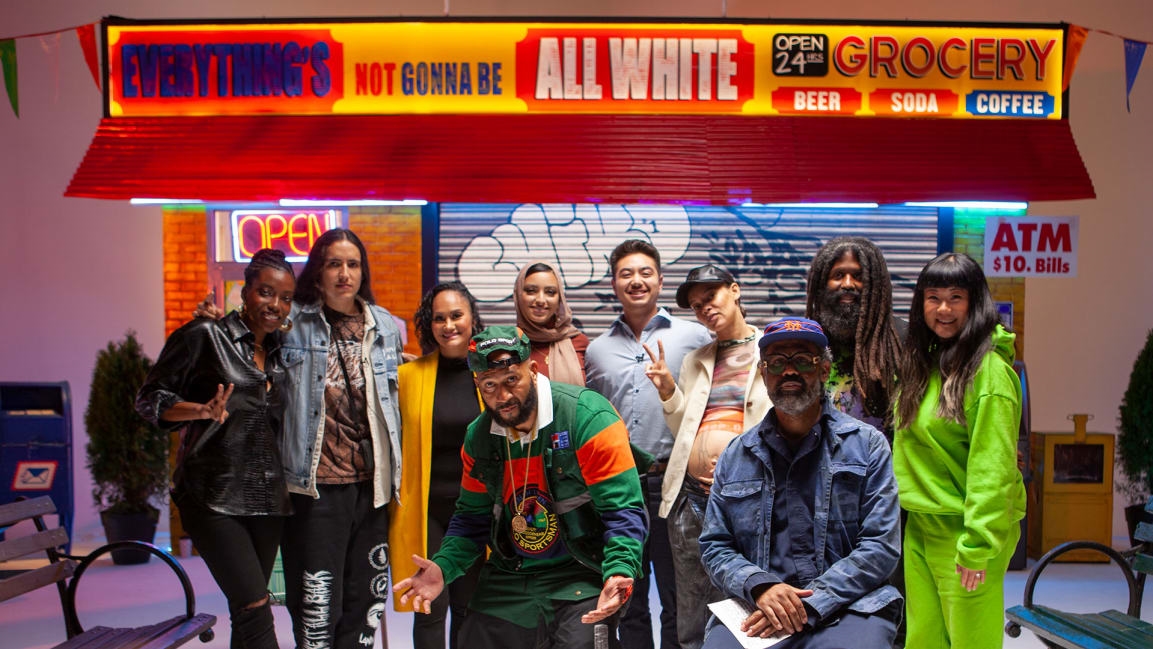Docuseries ‘Everything’s Gonna Be All White’ rebukes America’s history deniers
There’s a difference between not knowing something and actively choosing not to know it. The early-aughts film Memento, for instance—about a man with a brain disorder that prevents him from making new memories—perfectly illustrates this concept. It ends with its main character destroying hard evidence about what happened in his past so that he can go on believing what he’d prefer to believe about it forever.
His instincts are reasonable. Learning the truth can be scary! Especially when it’s a truth about one’s past that carries unflattering implications about one’s present. Actually acting on that instinct, though—and suppressing historic truth—is not reasonable. It’s cowardly, deceitful, and just plain wrong. Nevertheless, conservatives around the country have spent the past two years trying to Memento the evidence of America’s racist foundations out of their kids’ classrooms, out of the public discourse, and out of their own consciences.
They will never fully succeed as long as projects like Everything’s Gonna Be All White remain available.
Debuting February 11 on Showtime, Everything’s Gonna Be All White is a three-part documentary about the history of whiteness in America, as told exclusively by people of color. Because the series is critical about race, it will inevitably be dismissed by the crowd that would most benefit from watching it. They’re missing out on a gem. EGBAW serves as both a rejoinder to the conversation on critical race theory and a comment on its historic lineage.
“The biggest lie is that we already know everything we need to know about American history,” says Nell Irvin Painter, a history professor at Princeton University, at the beginning of the doc. “And I think one of the definitions of American whiteness is not knowing American history.”
Painter is one of several talking heads who populate EGBAW. She is joined by comedians Amanda Seales and Sherrod Small, rappers Styles P and Bun B, activists such as Tamika Mallory, and cultural commentator Jemele Hill. As the documentary glides smoothly from topic to topic, the format resembles nothing so much as VH1’s I Love the ’90s meets the 1619 Project.
Although the series is focused on history, it starts off in the present. Well, not quite the present, but close: January 6, 2021. What happened that day encompasses too many ideas the documentary touches on to be ignored. As the narrator states, the Capitol rioters were “inspired by a distorted view of history, emboldened by the presumption of privilege, and terrified by the prospect of a more colorful America.” It might be a generalization to apply all three points to everyone who entered the Capitol, but it’s probably safe to put at least one on all of them.
Elsewhere, the show untangles thorny ideas such as the invention of white people and the value assigned to whiteness in America, housing as structural racism, the utility of blackface and “blaccent,” “Shut up and dribble,” and how strange it is that children of the 1980s played with a toy car—the General Lee from The Dukes of Hazzard—that had a Confederate flag festooned on its roof.
Each of these topics is legally forbidden from discussion in several American classrooms right now.
Being that this is a Showtime documentary and not a lesson plan, nobody involved seems to hold anything back. At one point, Small is talking about Civil War monuments (“Why do we have statues of people we defeated in war?”) and the director asks him about white people who want to honor their ancestry. Small couldn’t be any more clear or blunt in his response: “Fuck ’em. Fuck your ancestry,” he says. “They were fuckin’ assholes. Deal with that. We can talk about it. But bring that statue down.”
The subject matter stays at this level of heaviness the entire time, but Jenkins approaches it with a mostly light touch. The interviews and narration are broken up with interludes that feel like sketches. During the inevitable dissection of Karens, the doc suddenly morphs into a parody of those BuzzFeed videos about evolving fashion trends, showcasing various modes of Karens throughout history. (Sarah Cooper’s Netflix special tried a similar gambit back in 2020, to lesser effect.)
Among the more notable devices Jenkins employs is a fictional white guy, Mad Chad (Michael Kaves), who rebuts every point the documentary makes with realistic invective. Mad Chad’s frequent intrusions make for a jolting contrast. It’s like when a Newsmax soundbite is quote-tweeted into an otherwise left-leaning timeline on Twitter: empty, instantly debunked, and yet futile to argue over.
The bulk of the documentary centers on the experience of Black Americans in the history of whiteness, but occasionally the spotlight drifts to other groups and subgroups. Margaret Cho hilariously elucidates Kung Fu star David Carradine’s lifelong commitment to pretending to be Asian American, for instance, and Nick Estes, an assistant professor of American studies at the University of New Mexico, goes deep on the hardships that Native Americans still face, centuries after the genocide of their ancestors.
One of the more productive conversations in the documentary, though, emerges among a group of Afro Latin women in the final episode. It starts with a controversy from last summer, when the film In the Heights debuted to a lukewarm box office response and accusations of colorism. Based on Lin-Manuel Miranda’s other smash musical, the film depicts a splashy, tuneful romance in the vibrant Manhattan community of Washington Heights. The problem? While the film was marketed as a landmark moment in authentic Dominican representation, the dark-skinned Afro Latinos who make up a substantial portion of that community weren’t much represented on-screen at all. The resulting outrage was so pronounced that Miranda eventually issued a thoughtful apology for falling short.
EGBAW explores the controversy by facilitating an informal roundtable of Afro Latin folks at Miss Rizos salon in Washington Heights. While all parties involved were put off by the casting snub of In the Heights, they disagree on the response to it. Carolina Contreras, the salon’s owner, is the outlier. As a fan of Miranda’s musical—and a member of the community it depicts—she found herself at once both excited and disappointed by the movie. The high temperature on social media, however, made her feel as though she were only “allowed” to feel the latter exclusively, instead of both at the same time.
“I do think that it’s a dangerous line that we are now navigating,” Contreras says, “where we are holding folks accountable, we’re being critical . . . we’re being radically critical.”
The phrase radically critical doesn’t go down smoothly, but the group hears Contreras out, because everyone respects each other and, crucially, they are not having the conversation on social media.
Whether one side is more right than the other, I would not presume to know. But the moment lends some stark perspective to what people in America consider to be radically critical at the moment.
For people of color, it means boycotting a movie over racial inaccuracy. For certain terrified white people, it means forbidding children to learn racially accurate history.
Fast Company , Read Full Story
(52)



